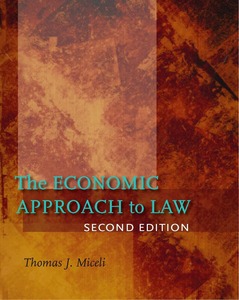Chapter 9
1. Discuss the normative question of whether or not the gains to offenders should be counted in social welfare when determining the optimal enforcement policy.
2. Statutory sentencing guidelines place tight restrictions on the ability of judges to exercise discretion in determining criminal penalties after the fact. Provide an argument for or against such guidelines based on the economic theory of law enforcement.
3. Discuss the arguments for and against conditioning criminal fines for a given crime on the offender’s wealth.
4. Provide an economic analysis of the following fine policy for overdue items at a public library: There will be a $1.00 per day fine every day that an item is late, up to a maximum of 3 times the cost of replacing the item.
5. Discuss the costs and benefits of legalizing drugs.
6. There is considerable statistical and anecdotal evidence that crime rates are higher in cities compared to rural areas, and that crime rates tend to rise with city population. Does the economic theory of crime provide any insights into why this is the case?
